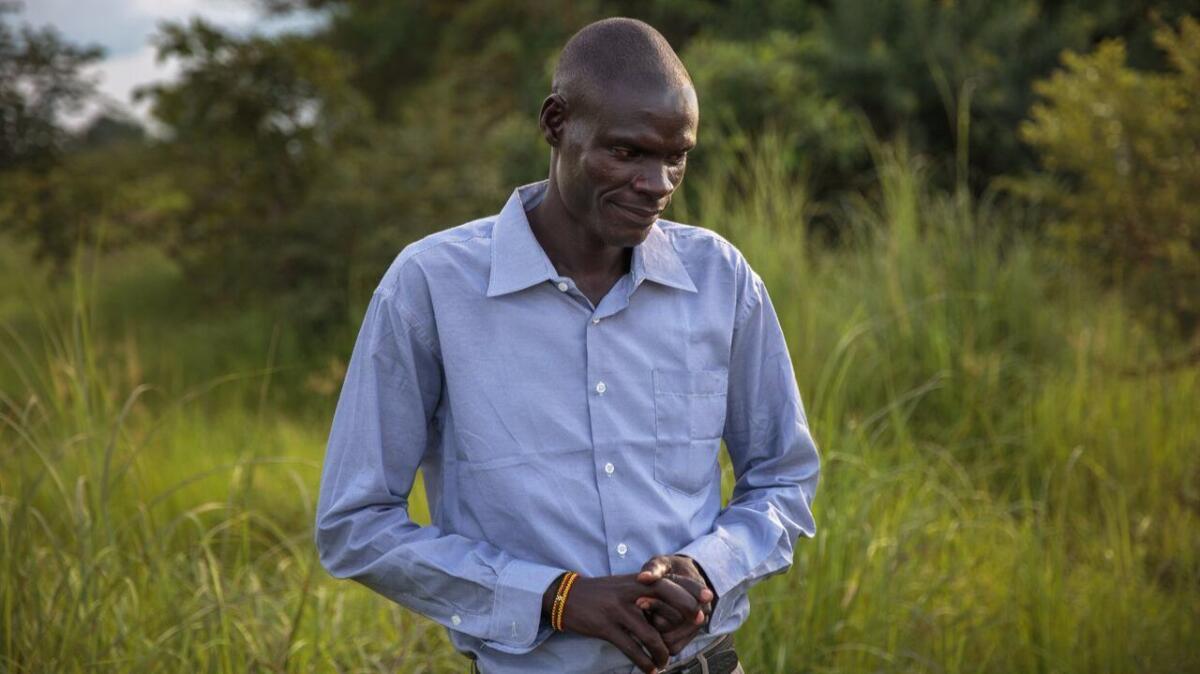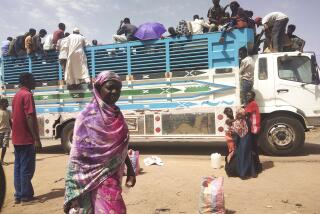A man and his machine in Africa — and his quest to bring healthcare to his people

Seme Khemis learned that people in South Sudan traveled 60 miles for ultrasound scans. (Oct. 5, 2017)
The refugees cross a narrow wooden bridge over a stream from South Sudan’s war to Uganda’s refugee camps carrying bundles of clothes, mattresses and sacks of cassava flour. They wheel bicycles or even drive a few goats.
Seme Khemis arrived in January carrying a box on his head.
Inside was an ultrasound machine.
The story of Khemis and his machine is that of one man’s struggle to make a small difference in a country ravaged by war and neglect.
Khemis, who is 31 and has a thin face, gentle eyes and a manner that veers between breathless enthusiasm and stoic compassion, is not a doctor. But he is intimately acquainted with South Sudan’s impoverished health system.
Bringing healthcare to one tiny community was the thing that he felt he could do that would help most.
War has been a near constant in South Sudan. The war of independence from Sudan raged from 1983 to 2005 and left few rural schools, clinics, wells or paved roads. Independence finally came in 2011, but less than two years later war broke out again — a power struggle between two factions of the former rebel movement that controlled the government.
Today, South Sudan spends less than 3% of its budget on health services. The United Nations and humanitarian organizations try to fill the gaps.

Khemis’ home village of Kularima in the south of the country had no health services. When he was 2, his mother died giving birth to twins, both of whom died two weeks later.
“There was no system of health,” he said. “People just delivered locally at home.”
His father had mental health problems and drank too much, sometimes sitting all day gazing at nothing, or wandering aimlessly. Khemis would sometimes follow at a distance, but his father usually spotted him and shouted at him to go home.
“He’d go to the forest alone and stay there,” Khemis said. “You wouldn’t know where he was going. Sometimes he would sleep anywhere.”
When he was 9, Khemis came home to find his father had fallen into the family’s cooking fire. With no health services, the family applied an antiseptic to his burns. But he died a week later, leaving behind Khemis, his three brothers and two sisters.
His two grown brothers were illiterate and too poor to care for the children. So an uncle, who was a soldier, took them in and promised to send them to school.
Instead, he put them to work. Khemis had to dig the garden and look after the goats. One sister had to fetch water and firewood, grind sorghum by hand, cook and clean. It was too much for her, so Khemis helped her early in the mornings or late in the evenings — and fantasized about how they could escape from their uncle.
“When I went inside, I’d cry,” he said. “Sometimes I would not be able to eat food. I was too angry. I thought if I was big, I’d fight him, but I was too small.”
The chance to get away came when the military stationed his uncle out of town. Khemis followed some other children to school, enrolled himself and moved in with their family.
He worried about his sister, who was still trapped. She eventually decided marriage was the only way out and was wed at 15.
At the end of each school day and on the weekends, Khemis trained with a carpenter and sold the furniture he made to help his family. He finished school, but with no money for college, he got a job as a night watchman.
When one brother, 42-year-old Faustino, fell ill, the local clinics couldn’t help him. He died on the way to a distant hospital.
At 24, Khemis got a job with a medical service company operating a clinic in the capital city, Juba. It was there that he first saw the ultrasound machine. Pregnant women and other patients would travel for hours from surrounding towns for scans.
Khemis worked his way up at the clinic, studying for a degree in logistics in his spare time.
A few years later, in 2013, war broke out in the city.
The clinic there shut down. Khemis took in three nephews and niece after his closest brother, Moses, a soldier, was killed in the fighting.
As the situation grew more dire, Khemis felt he had to do something.
Then he got an idea. Many of the ultrasound patients at the Juba clinic had traveled 60 miles from the small town of Lainya, which didn’t have its own machine or, for that matter, much good medical care at all.
Khemis figured that if he could get a hold of the ultrasound machine, he could set up a health center in Lainya and cover most of the costs with the payments collected for the scans.
So he negotiated a rental deal for the machine, bargained with local authorities for the necessary permission, parted with his life savings of about $2,000 and hired three doctors, six nurses and four clinical assistants.
The day in 2015 that the clinic opened, elders slaughtered a goat and said a prayer, Khemis read out a long list of all the medical services the clinic would offer, and 25 patients showed up. The numbers only grew from there.
His plan had worked.
Soon the government hospital began referring patients and the clinic had to rent a bigger building with 10 rooms next to the tiny office it had started in.
Then one day in July 2016, Khemis heard shooting and saw people running. The war had arrived in Lainya.
The clinic staff fled into the bush, where high grass and thickets provided some cover from the fighting. “We left everything behind in the clinic,” Khemis recounted. “We only took a few clothes.”
A week later he crept back to find the clinic and local shops had been looted. Medicines were scattered everywhere or stolen. The refrigerators, generators and mattresses were gone too.
But the ultrasound machine was untouched.
Khemis put it in a box and carried it on his head back to the bush.
“I knew it would help in the long run,” he said.
The clinic staff hid there for two months, tending to people they encountered who were wounded in the fighting, until Khemis evacuated the doctors and injured to Uganda.
He stayed behind with his machine, hoping the situation would improve enough for him to reopen his medical center. But after several months, he gave up and joined a group of other refugees trekking to Uganda.
“We walked for four days,” he said. “I still had the ultrasound machine on my head.”
It was months before Khemis managed to bring several nieces and nephews from South Sudan to Uganda, where they now live with him in a refugee camp and attend school. His brothers and sisters fled to the Democratic Republic of Congo.
Khemis does not believe that there will be peace in South Sudan anytime soon or that he will be able to reopen his clinic back home.
His immediate hope is that he can find an operator for his machine, plug it into a generator and set up a small ultrasound center in the refugee camp. He has been trying to get permission from the Ugandan government, which runs the camp.
So the machine sits in his tent, boxed up, as if waiting for its moment.
This story was reported with a grant from the United Nations Foundation.
Twitter: @RobynDixon_LAT
ALSO
Armed only with her grandmother’s shotgun, a South African woman fights to save her rhinos
The neat-as-a-pin African country where people are executed for petty theft
More to Read
Start your day right
Sign up for Essential California for news, features and recommendations from the L.A. Times and beyond in your inbox six days a week.
You may occasionally receive promotional content from the Los Angeles Times.






